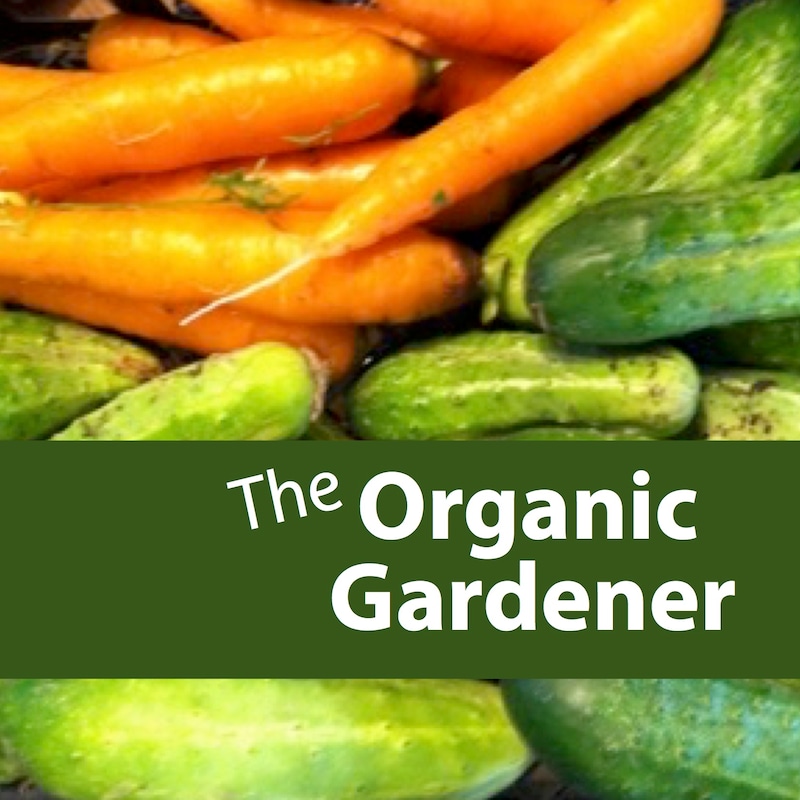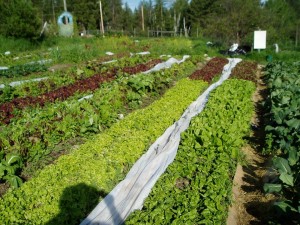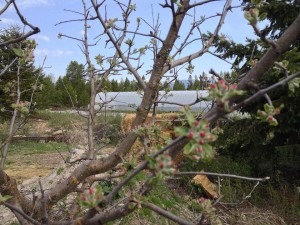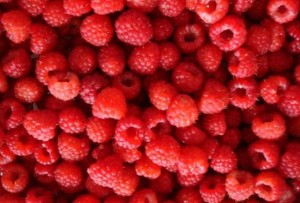
Shownotes
I’ve been trying to get this guest on to talk about vegetable production for quite a while but she’s always so busy and things have finally slowed down, even though she’s probably been in the hoop house/green house today. I know she has an amazing story. I got to meet her and tour her amazing farm so from Purple Frog Garden’s in Whitefish, MT
Pam Gerwe from Purple Frog Gardens has over 20 years experience growing vegetables for production in Whitefish, MT. Today she shares her expertise and knowledge of growing for market inspiring others to see how exciting it is to watching things grow when you give them a little bit of help and the right conditions!
Tell us a little about yourself.
Im interested in a lot of different things, I think I’m a family curious person which fits in my life as a market gardener. I am also actively engaged in community organizing around food systems. I am a founding member of a local non-profit called Nourish the Flathead. I’m also on the board for the North Valley Food Bank which is a really exciting food bank and having an exciting time there. I am50 something and am excited about that time in my life, my partner and I, Mike and I have been farming on this land since 1991, so we at this point where were like we certainly are not gonna work as hard as we have the last 25 years. So what are we gonna do?
We have no whole’s bared on potential ideas, yesterday we were talking about raising chickens for meat again, we talk about a pizza oven and agritourism a lot and cooking classes and working with teenagers. So I feel like we’re at a pretty exciting time on our farm.
We have a lot of infrastructure laid down on our farm and have a lot of different angles we could go for in our future.
That does sound exciting. I’m excited to be, I’m just about to turn 50 pretty quick here, I was just writing in my journal the other day, I think I’m the only person who wants to be older then I am, for some reason I always think when I get older, it’s gonna get easier? IDK… So you’re thinking aobu going back into raising chickens? Did you raise them before?
We did. At our peak of chicken mayhem, we probably had about 700 – 750?
No!
We mostly raised them for layers for eggs. We would raise a few meat birds a year, but mostly it was for eggs. We did it for 20 years. A couple of years ago we said “OK, we probably learned about all we’re going to from this experience,” and spent the past couple of winters without chickens. Occasionally we’ll say, “Oh, is it time to go get the eggs?” just kind of joking we don’t have to get up and leave the wood stove and get the eggs!
The demand for local is really high. I think the thought that our 50-100 hens that would be raised for meat would be raised by us for a humane, pretty nice life, and that would be 50-100 less that would have to be factory farmed. So we’re just talking about it, IDK if we actually will. A friend of ours, who originally got us started in chickens, is doing his chick order, and he was just asking if I wanted any meat birds, so that kind of kicked the conversation around in my head. Mike and I were talking about it, who knows if we’ll really do it, we have a new saying, “We’re just talking! We’re not making a list…”
We don’t need to make a list, we don’t need to write down the tools we need and make a plan. We’re just talking! It’s exciting!
700-750 chickens mostly for eggs! That just sounds! You have to tell us about raising 700 chickens? I can’t even imagine raising like 25 chickens! I mean we’ve had at our peak maybe 10 chickens! How long does it take you to collect the eggs from 700? And where do they lay them?
There was really only 750 one summer that we had that many and it was a mix of babies and old girls. AWE would have about maybe, in peak of our production, we had maybe 400 laying hens. The rest were replacement birds or just old hens that we hadn’t you know, killing birds is hard, it’s sad, they provided us with a service. We often would have hens that weren’t really laying eggs and just kept them around. When we decided we were no longer gonna do it, we just slowly through attrition by not replacing our flock… was how we went down into more reasonable numbers.
How long does it take to collect about 400 eggs? Do you just go out there with baskets. Then what do you have to do take them to market to sell every day? What is that like? Do you get about 400 eggs a day? Do you get that many?
You get about 2/3 of that amount. And then we would, we sold them locally to:
- restaurants
- wholesale accounts
- adopt a chicken – we nourish it, you get eggs and we get money
That was really the beginning of our adventure to CSA marketing. People would pay us in advance for x number of dozen of eggs. That was really a successful way to market to eggs, and people felt engaged and connected to our farm.
One of my favorite things of where we are at. A lot of people have known about us for a long time, sometimes I’ll have young people in their 20s who say, OMG I came to your farm when I was in 3rd grade and this is what happened? They just remember it so clearly and vividly and so it’s just so pretty exciting to have that memory in our community around our farm.
I remember when I was growing up, there was a little farm close to my mom’s house, and going to a farm when I was a kid and we could take the tops of the carrots and go feed the rabbits! Grossman’s Farm on Nassau Blvd. Now how did that work? They would just pick up their eggs with their CSA share?
We were not doing a vegetable CSA, we just had a fridge on the porch and a dry erase board. They would just come get the eggs when they wanted them, and then write their name on the dry erase board and we would keep track of it that way.
I love it and a dry erase board with a fridge where people would just come help themselves to eggs and keep track of it that way.
Tell me about your first gardening experience?
From Virginia, when I was growing up probably in Jr. High, at the house I was going up in we had a bunch of tomatoes. But that was about it. I remember liking to check the tomatoes and thinking that was pretty great.
But probably the most impactful was when we first moved to Whitefish. We lived in town and our neighbor Casey Groman had a really great garden. We would bring her compost and look over her fence, and watch everything growing, and that is a garden that I feel a connection to, as far as a mentor and really seeing what you could do in a pretty small space!
What does organic gardening/earth friendly mean to you?
I was thinking about this questions, I think it’s really important to consider your inputs. What happened for me at one point when we had too many chickens, kelp was one of the ingredients we would feed them.
We made up the feed ourselves, we purchased the whole grains and grew some stuff ourselves and mixed the feed ourselves and and kelp was one of the ingredients. When you buy a pallet of anything. When you try to be mindful of your impact onto planet, you say, “Wow, I’m buying a whole pallet of kelp? What does that mean?”
So I had to begin the whole research train of figuring out, this is what they do with kelp, it’s pretty interesting with kelp, they have these huge barges, like lawnmowers, they cut however many feet of the kelp forest, which is able to replenish itself pretty quickly. So that seemed like a reasonable sustainable method of an input for us. So I guess I think that’s really important for you to continue and to consider and examine, what your impact on the world is as far as the choices that you’re making.
You made your own chicken food? What else goes into chicken food?
We use lentils, because it was something we had access to. The digestive enzyme that chickens need to be able process lentils, they have to get it when they are young so you need to start mixing it in when they are babies, then as their intestinal flora they need to help make them strong for to have that be a viable nutrient for them. And then we also used local grains, like wheat and barely and oats. Just depending upon what we were able to access at a given time.
Probably if we had followed a little more scientific model we’d have more egg production, but it was important to us is to use local grain growers, and something that is always a concern and issue in animal feed is the protein. Most organic feed, much animal feed has soy in it, and much soy is genetically engineered, the soy that is organic is mostly grown in Brazil, so then you’re cutting down the rain forest, it’s just this layer after layer of complexity when you are accepting responsibility for so much life, so you just have to ask the questions. That was about the basic mixture. We would also sprout grains, and the chickens would really like that and we would sprout them all the way up to grass and give it to the chickens in the winter.
Wow I knew you were gonna be an awesome interview full of tons of great stuff!
Who or what inspired you to start using organic techniques?
I think I’ve always just known that organic was the only way to go. One of the things that I’ve learned as we’ve gone on is resource availability
When we first moved to our farm, it’s very very clay, very clay rock not very good soil, we were looking for biomass to help increase the top soil and I called the city and said “What do you do with your leaves in the fall.” They said, “ Oh, well, we burn them.” And I said “that’s terrible.”
So I began a relationship with the city of Whitefish and so they have been brining us all the residents leaves for all the past 20 something years. We’ve opened hundreds and thousands of leaf bags. That’s one of our plans for our soil fertility. So anyway, organic is like looking into the resources in your community that are often by-products that will help increase your soil fertility.
I think that’s gonna give people tons of ideas.
One caveat would be grass clippings, early on in our career when we were really struggling with soil fertility. We had, like I said, we had a a couple of lawn maintenance people who would bring us grass clippings. But the reality is that most people really spray a lot of terrible chemicals on their lawn. One of the largest consumers of Roundup is the household yard.
At some point we decided we can’t do this anymore. So pretty early on, we decided that, even though it was this beautiful bountiful supply of nitrogen coming to the farm, we couldn’t do it, we couldn’t keep up, and follow the train of clean grass clippings vs dirty ones. It really makes a big difference. There’s quite a few plants that if you put poison grass in your garden you will see the ramifications of that for a couple of years, several years!
You know that’s probably one of the biggest thing I’ve learned since I started my podcast is that’s one of the craziest things we do is put chemicals on our lawns, especially for people who let their toddlers crawl on their lawns, and also for pets who play close to the grass…I had no idea how bad those chemicals were. I think I just haven’t paid attention because we don’t spray our lawn and my mom never sprayed hers. I have had a lot of people talked about how incredibly dangerous those chemicals are.
When your company is called Chem-lawn… you can imagine….
What’s Expanding at the Food Bank
I meant to ask you when you first started talking about the food bank and what’s exciting that’s gonna happen at the North Valley Food Bank this year?
Whitefish is a very generous community. The North Valley Food Bank is just this amazing new building our founder and chief June Munskee had volunteered so long in the community to help with food security issues. She was in her 80s and the community could see that she had devoted her life toward this issue and I think in recogniztino of that, the community built this amazing facility! It’s spacious and light and has a small butcher shop!
It just really has a lot of potential. June was able to serve our clients one time in our new facility and then was not able to help any longer and in a very short time she passed away. I think it was just so great that she got to see all of her hard work and her new facility and go serve clients one time in this new facility.
So we as a board and organization, where we’re grieving our founding member and getting a new building and just figuring out how to handle those two things simultaneously.
We hired our first employee! Everybody has always been volunteers. Our executive director is doing a really good job, she’s getting her footing in the community, and we kind of stabilized from those two huge transitions and now we’re just looking forward at all the potential impact we can have in our community and how to best serve our clients. Skies the limit!
I’m sorry to hear about June but that is still a touching story.
How did you learn how to garden organically?
I think mostly it was just :
- trial and error
- practice
- reading about it
- having a few mentors
And Casey was definitely told me stuff about her garden that we used to peer over the fence. Then we had a mentor who lived next door to us, who was very helpful, Gladys, who answered a lot of questions, taught me how to slaughter chickens., really was someone who knew a lot and had a lot of info that I didn’t have.
I grew up in suburban USA, So there were a lot of things I wanted to incorporate into my life but I had no idea how to do them. Mike had a little more experience then I did in that arena. Gladys definitely taught both of us a lot.
Tell us about something that grew well this year.
Had a really nice apple and pear crop, which was really exciting to us because we had joked for years that our apples and pears trees that we planted were our 401k. That our retirement was invested in them. When we first planted them, we we’re not able to give them the attention that a plant required deserves in the beginning of life.
they struggled in their early years, so now we’re starting to take much better care of them Giving them love, we are learning more about pruning, each year we learn more and more about pruning, which I think is really an art. The trees were very productive, we’ve been waiting a long time for them to start producing like they did this year.
One thing that was really interesting that happened was that we were short staffed this summer and we were pretty tired. Usually we have tons and tons of raspberries and it takes hours to pick them. We had a slight raspberry crop this year, which was such a gift because we wouldn’t have had time to stay smiling and pick the raspberries. I just think its neat when those things kind of work out like that!
We didn’t have a big raspberry crop this year, maybe because of the weather?
Well 2 things:
One of my most listened to guests is Russ Metge in Episode 26 from Utah who talked about pruning fruit trees. And the difference between pruning a fruit tree and pruning a flowering tree, IDK the difference there. That’s kind of interesting that your trees weren’t doing much and then you gave them some attention? What other things did you do?
I think they like the most important thing is, what’s the saying? I think it’s like a $3 tree and a $20 hole, or something like that?
Really the early care of the tree matters a lot. One of the things that happens on homesteads is that you always think your gonna get to it. Oh yeah, I’m gonna plant this tree and then I’m gonna hook up the irrigation, and suddenly it’s July and you’re like I still haven’t set it up and then it’s August and your carrying buckets of water to the tree because you...






